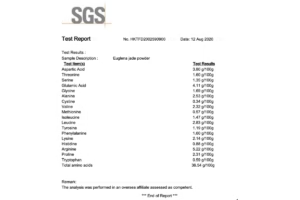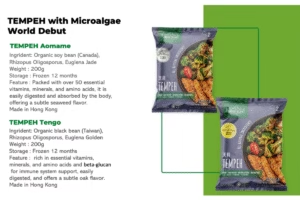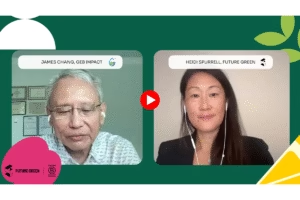Algae for the Planet, Protein for the People
In this Member Podcast episode, Heidi is in conversation with James Chang, founder of GEB Impact Technology, about how microalgae food innovation can deliver sustainable nutrition, climate resilience, and a new future for food.

🎧 Hit play to dive into the full podcast with Heidi & James.
GEB Impact’s Radical Rethink of What We Eat
By the time you finish reading this sentence, a single microalgae cell could have already doubled. Now imagine what that could mean—for food security, climate resilience, and even your next meal.
At first glance, algae doesn’t scream “superstar.” But to James Chang, founder of GEB Impact Technology, it’s the missing link between a healthier planet and healthier people.
🔬 The Algae Awakening
James’s journey back to Hong Kong began with family—and a question: How can we build a business that survives and heals? After digging into biotech and renewable energy, one organism kept resurfacing: microalgae. For the nerds in the room…
Turns out, these single-cell organisms are:
- Insanely efficient (splitting 4x a day),
- Nutritionally loaded (with omega-3s, protein, and beta-glucan), and
- Carbon-hungry (each ton of algae mitigates up to 2 tons of CO₂).

Source: SGS Protein Profile Analysis commissioned by GEB Impact Technology. Algae is small but seriously mighty.
But not all algae are created equal. GEB cultivates Euglena in controlled environments—eliminating contamination and maximising nutritional yield. Think: a cleaner, greener version of fish oil, minus the fish.
🍽️ From Lab to Lunchbox: The Rise of Eiyoka
To bring algae to your plate, GEB launched Eiyoka—its food innovation arm.
- Tempeh fortified with microalgae? Check.
- Halal-certified, plant-based protein for Asia’s growing markets? Check.
- Award-winning culinary oil made from Thrive algae? Check.

Thrive Algae Oil: chef-ready and heart-healthy.
The goal: Create demand, reduce cost, and make algae-based nutrition affordable and accessible—especially in regions that need it most.

Tempeh meets microalgae: flavour, function, and clean protein.

World debut: microalgae-fortified tempeh for modern menus.
🌍 Scalable. Local. Game-Changing.
Unlike soy or beef, microalgae don’t need deforestation, vast farmland, or heavy water use.
This decentralised model could empower local farmers to grow their own high-value protein—and build climate-resilient supply chains without the usual environmental cost.
🧠 A Smart Future with AI
GEB is even training AI to optimise algae growth.
With variables like light, temperature, and nutrient flow, James sees machine learning as the next step to scale algae production sustainably and predictably.
💚 Regeneration in Action
GEB is even training AI to optimise algae growth. With variables such as light, temperature, and nutrient flow, James sees machine learning as the next step in scaling algae production sustainably and predictably
And in case you missed it: GEB recently bagged the Greater Bay Area ESG Sustainable Enterprise Award for their Thrive Culinary Oil.

🏆 Big smiles all around as GEB takes home the Greater Bay Area ESG Award!
📣 Final Thought
Algae may be small, but its potential is massive. And with leaders like James Chang driving innovation at GEB Impact, the future of food might just come from the sea—but without the plastic, pollution, or planetary cost.
Hungry for impact? Keep an eye on GEB. The greenest revolution might be microscopic.
☕ Want to Chat with James?
He’s happy to connect for a coffee chat—and he means it. Feel free to visit Geb Impact Website.
🤝 Want to become a Future Green member like Geb Impact?
Join our community of passionate food and sustainability professionals. As a member, you’ll gain access to exclusive resources, practical tools, and inspiring events that support your journey toward positive food sustainability change.
👉 Get your membership and start making an impact!
📅 Book a discovery call to learn how Future Green membership can support you
